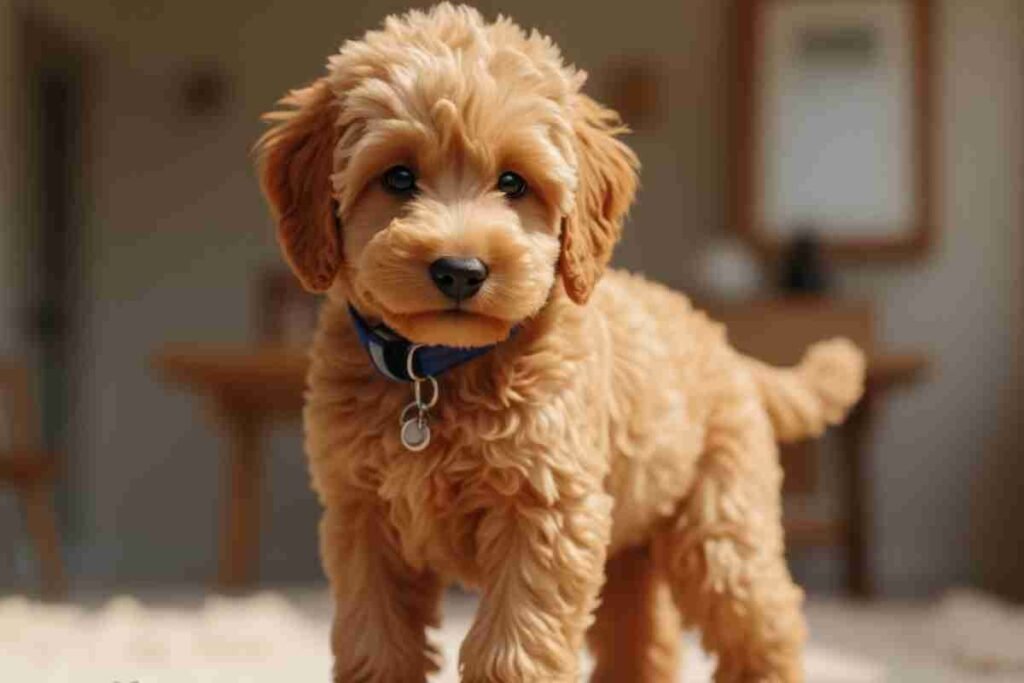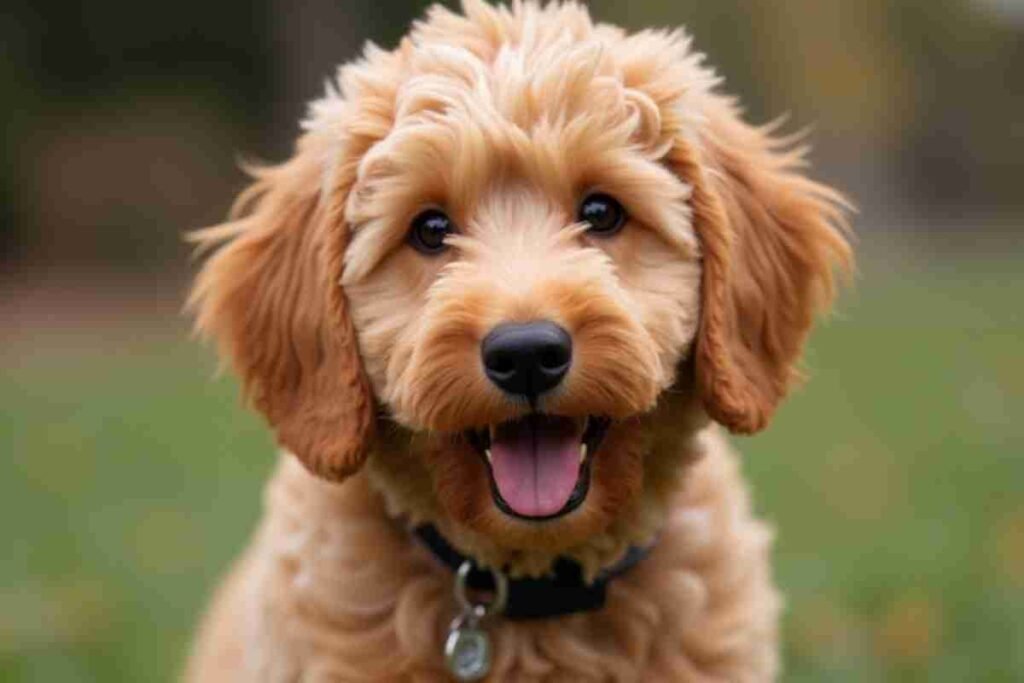The Mini Goldendoodle is a small, intelligent, and affectionate designer dog that blends the best of the Golden Retriever and Miniature Poodle.
With their low-shedding coats, friendly nature, and compact size, they’ve become a top pick for families, singles, and allergy sufferers alike.
What Is a Mini Goldendoodle?

The mini Goldendoodle is one of the most beloved designer dog breeds, prized for its hypoallergenic coat, lovable personality, and manageable size. A cross between a Golden Retriever and a Miniature or Toy Poodle, this hybrid dog combines the best traits of both parent breeds.
Whether you’re looking at a Goldendoodle puppy or a full grown Goldendoodle, these dogs are intelligent, social, and well-suited for families and singles alike.
The popularity of mini Goldendoodles has soared in recent years, leading to an increase in searches for phrases like mini-Goldendoodle for sale, mini-Goldendoodle puppies, and even mini-Goldendoodle for sale near me. But there’s much more to these fluffy companions than their adorable looks.
The Origins of the Mini Goldendoodle
The Goldendoodle was first bred in the 1990s to create a guide dog that was suitable for people with allergies. This goal was achieved by crossing the golden retriever, known for its friendliness and intelligence, with the poodle, a breed celebrated for its hypoallergenic coat and remarkable trainability.
The “mini” version came later, using a miniature or toy poodle in the crossbreeding process. This smaller variation has made the breed more accessible for apartment dwellers and those wanting a more compact canine companion.
Unlike the purebred golden retriever or poodle, the mini Goldendoodle is considered a hybrid dog or a mixed breed, though many owners will argue that their unique characteristics make them just as desirable as any purebred.
Appearance and Size of the Mini Goldendoodle
Mini Goldendoodles typically weigh between 15 and 35 pounds and stand around 13 to 20 inches tall at the shoulder. However, their exact size can vary depending on their parent dogs. Some breeders also offer micro Goldendoodles, which weigh even less and are bred for those desiring a tiny companion with all the features of the larger doodle.
Their coats range in texture from wavy to curly and come in various colors including cream, apricot, red, chocolate, black, and even merle. Because their coat is inherited from the poodle, it tends to shed less, making them attractive to people with allergies. However, it also means they require consistent grooming to avoid painful mats.
Mini Goldendoodle Temperament
This hybrid dog inherits the Golden Retriever’s loyal, people-loving personality and the Poodle’s intelligence and alertness. This makes the mini Goldendoodle an affectionate, energetic, and trainable pet.
Goldendoodles thrive on companionship. They do not like to be left alone for extended periods and may develop separation anxiety if neglected. These dogs are best suited for homes where someone is around most of the day or where there are other pets for company. Their affectionate and gentle temperament makes them excellent therapy dogs and great companions for children.
Mini Goldendoodle Puppy Behavior
Mini Goldendoodle puppies are energetic and eager to explore. Early socialization and training are crucial to ensure they grow up to be well-rounded dogs. Crate training, positive reinforcement, and social exposure during their early weeks can significantly impact their behavior as adult dogs. Because they are very intelligent, these puppies learn quickly but also get bored easily. Keep training sessions short and engaging.
Exercise Needs and Energy Levels
Mini Goldendoodles are high-energy dogs that require daily physical and mental stimulation. A full grown mini needs at least an hour of exercise each day. This could include a combination of walks, runs, and playtime. Activities like fetch, agility courses, or even swimming, something they often inherit a love for from their retriever parent are great ways to burn off energy.
Mental stimulation is equally important. Without it, your Goldendoodle mini may develop destructive behaviors. Puzzle toys, scent games, or even basic obedience drills can help keep their minds active.
Grooming Your Mini Goldendoodle
The low shedding coat of the mini Goldendoodle is a major draw for prospective pet owners, especially those with allergies. However, their wavy or curly hair is prone to matting and requires regular grooming.
Professional grooming every 6 to 8 weeks is recommended. In between visits to a dog groomer, you should brush your Goldendoodle several times a week to prevent tangles and mats. If you skip grooming, their coat can become painful and matted, requiring a close shave.
Regular grooming also includes nail trimming, ear cleaning, and dental care. Goldendoodles, like many poodle mixes, are prone to ear infections due to their floppy ears. Keep them dry and clean to avoid problems.
Are Mini Goldendoodles Hypoallergenic?
While no dog is 100% hypoallergenic, mini Goldendoodles are considered a low-allergen breed due to the influence of the poodle’s coat. This makes them a popular choice for families with mild allergies. Still, it’s a good idea to spend time around a Goldendoodle before bringing one home to see if allergic reactions occur.
Health and Lifespan of Mini Goldendoodles
Mini Goldendoodles are generally healthy dogs with a lifespan of 10 to 15 years. However, like all crossbreed dogs, they can inherit health issues from either parent breed.
Some common health concerns include:
- Hip Dysplasia
- Patellar Luxation
- Progressive Retinal Atrophy (PRA)
- Hypothyroidism
- Von Willebrand’s Disease
- Gastric Dilatation-Volvulus (Bloat)
To minimize health risks, choose a breeder who conducts genetic testing and is a member of reputable organizations like the Goldendoodle Association of North America.
Mini Goldendoodle Training Tips
Mini Goldendoodles are smart and eager to please, which makes them relatively easy to train. Positive reinforcement methods, such as treats and praise, work best.
Avoid harsh corrections, as this breed is sensitive and can become anxious if training is too intense or overly demanding and negative.
Consistency is key. Early obedience training and socialization can prevent behavioral issues like excessive barking, jumping, and nervousness. If you have young children, include them in training to ensure consistent commands and rules.
Feeding and Nutrition
A balanced diet is crucial for a healthy mini. Choose high-quality dog food appropriate for their age, size, and activity level. Some dogs may benefit from grain-free options, but always consult your vet before making changes to your dog’s diet. Incorporating nutrients aimed at boosting your dog’s immune system can also help promote long-term health and prevent common illnesses.
Avoid overfeeding. Because mini Goldendoodles are relatively small dogs, extra weight can quickly lead to health issues such as joint stress or diabetes.
Finding Mini Goldendoodles for Sale
The growing popularity of this breed means there are many mini Goldendoodle breeders to choose from. However, not all breeders are ethical. Look for those who prioritize health testing, offer transparency about the puppy’s lineage, and are willing to let you meet the puppy’s parents.
Searches like Goldendoodle for sale near me can help you find local breeders, but always do your homework. Avoid puppy mills and backyard breeders. Alternatively, consider adopting from a rescue or breed-specific organization. You may even find mini Goldendoodles needing rehoming.
Micro Mini Goldendoodle: A Smaller Alternative
For those looking for an even smaller version, the micro mini Goldendoodle might be ideal. Bred using toy poodles and often under 15 pounds, these dogs are perfect for city living.
However, because of their tiny size, they can be more fragile and may have additional health concerns. Always work with a knowledgeable breeder if you’re interested in this variation.
Comparing Mini Goldendoodles to Other Doodle Breeds

The mini Goldendoodle is often compared to other designer dogs like the Aussiedoodle, Bernedoodle, and Labradoodle.
While each doodle has its own unique traits, Goldendoodles are typically more people-focused and adaptable.
Aussiedoodles may be more energetic and require additional mental stimulation, while Bernedoodles are often calmer but larger in size. The choice depends on your lifestyle, experience, and what you’re looking for in a canine companion.
Conclusion
Mini Goldendoodles are one of the most versatile, loving, and low-shedding designer dogs available today.
Whether you’re seeking a cuddly companion, a therapy dog, or a playful pet for your children, this crossbreed fits the bill.
With proper care, training, and love, a Goldendoodle will become an irreplaceable and joyful part of your loving family.
FAQs
What is a Mini Goldendoodle?
A Mini Goldendoodle is a cross between a Golden Retriever and a Miniature or Toy Poodle, known for its intelligence, loving nature, and low-shedding coat.
How big do Mini Goldendoodles get?
They typically weigh 15–35 pounds and stand 13–20 inches tall, with micro versions being even smaller.
Are Mini Goldendoodles good with kids?
Yes, they are gentle, affectionate, and make excellent family pets, including with young children.
Do Goldendoodles shed a lot?
No, they are low-shedding due to their poodle heritage but need regular grooming to avoid mats.
Are Mini Goldendoodles easy to train?
Yes, they are smart and eager to please, making them highly trainable with positive reinforcement.
How much exercise does a Mini Goldendoodle need?
They need at least an hour of daily physical and mental activity to stay happy and healthy.
What health problems can Goldendoodles have?
They may face issues like hip dysplasia, PRA, or bloat; choose breeders who do genetic testing.
Are Goldendoodles hypoallergenic?
They are not 100% hypoallergenic but are a great choice for mild allergy sufferers due to their coat.






